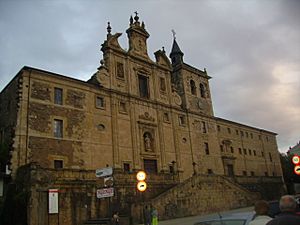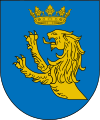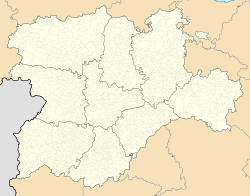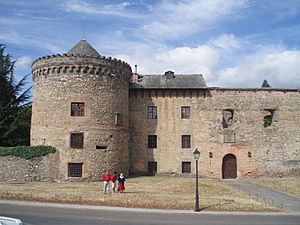Villafranca del Bierzo facts for kids
Quick facts for kids
Villafranca del Bierzo
|
||
|---|---|---|

Convento de Padres Paúles. (Priory of the Paulist Fathers)
|
||
|
||
| Country | Spain | |
| Autonomous community | Castile and León | |
| Province | León | |
| Comarca | El Bierzo | |
| Judicial district | Ponferrada | |
| Area | ||
| • Total | 177.37 km2 (68.48 sq mi) | |
| Elevation | 505 m (1,657 ft) | |
| Population
(2018)
|
||
| • Total | 2,974 | |
| • Density | 16.767/km2 (43.427/sq mi) | |
| Demonym(s) | Villafranquinos | |
| Time zone | UTC+1 (CET) | |
| • Summer (DST) | UTC+2 (CEST) | |
| Climate | Csb | |
Villafranca del Bierzo (in Galician: Vilafranca do Bierzo) is a charming village and a municipality. It is found in the region of El Bierzo, located in the province of León, within Castile and León, Spain.
This village is about 187 kilometers from Santiago de Compostela. It sits right between Ponferrada and O Cebreiro. Villafranca del Bierzo is an important stop on the famous Way of St. James (Camino de Santiago) pilgrimage route.
Contents
History of Villafranca del Bierzo
The first people lived in this area a very long time ago, during the Neolithic age. Later, a group called the Celtiberians lived here. Their town was known as Bergidum. After the Romans took over, it was called Bergidum Flavium.
The Middle Ages and the Way of St. James
The town of Villafranca is first mentioned in history around the year 791. The modern town grew because of the Way of St. James. It became a popular resting place for pilgrims traveling to Santiago de Compostela starting in the 9th century.
In a famous old book called the Codex Calixtinus, Villafranca is mentioned as a stop between Rabornal and Triacastela. In 1070, during the time of King Alfonso VI of León, a special monastery was built here. It was a Cluniac monastery, and its main job was to grow wine.
A community of French pilgrims grew around this monastery. This is how the town got its name, "Villafranca," which means "French Town." Many hotels and hospitals were built to help the pilgrims.
Later History and Important Events
In the late 12th century, King Alfonso VII of León gave control of Villafranca to his sister Sancha. Over time, it was passed down to many other important noble families.
In 1486, the area became a marquisate, which is a type of noble land. It was given to Luis Pimentel y Pacego. His daughter later married Pedro Álvarez de Toledo, and his family kept control of the marquisate for many centuries.
In 1619, a saint named Lawrence of Brindisi was brought to Villafranca after he passed away in Lisbon. He was buried in the Monastery of the Assumption, where his remains are still kept today.
During the Peninsular War, Villafranca was an important base for the Galician army. It was attacked three times by English troops. Later, it was taken over by French troops. The Spanish general Antonio Filangieri died here. The town was finally set free in 1810.
Main Sights to See
Villafranca del Bierzo has many interesting old buildings and places to visit:
- Collegiate church of Santa María (built in the 16th-17th centuries)
- Church of St. John (from the 12th century)
- Church of St. Nicholas (from the 17th century)
- Church of Santiago the Apostle (built in the 12th-13th centuries)
- Monastery of the Annunciation: This is where the remains of saint Lawrence of Brindisi are kept.
- Monastery of St. Francis de Asís (from the 13th century): Only the old Romanesque church part remains. The upper front and two bell towers were added later in the 18th century.
- Castle of the Counts of Pena Ramiro (from the 16th century), which has four towers.
- Palace of the Marquisses of Villafranca (from the 18th century)
- Palace of Torquemada (from the 18th century)
Local Festivities
The people of Villafranca del Bierzo enjoy celebrating several local festivals throughout the year:
- January 28: Santo Tirso
- February 3: San Blas
- May 1: Festa do Maio
- June: Poetry festivity
- July 25: Santiago
- August: Tourist festivities
- September 14: El Cristo
Church of Saint Nicolas
The Church of Saint Nicolas (Iglesia de San Nicolas) was built in 1638. Today, it is managed by the Paulist Fathers. The money for building the church came from Gabriel Robles. He was a local person who became very rich by mining silver in Peru.
See also
 In Spanish: Villafranca del Bierzo para niños
In Spanish: Villafranca del Bierzo para niños
 | Chris Smalls |
 | Fred Hampton |
 | Ralph Abernathy |





